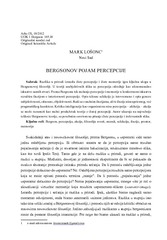Bergsonov pojam percepcije
Bergson’s notion of perception
Чланак у часопису (Објављена верзија)
Метаподаци
Приказ свих података о документуАпстракт
Razlika u prirodi između čiste percepcije i čiste memorije igra ključnu ulogu u
Bergsonovoj flozofji. U teoriji asubjektivnih slika se percepcija određuje kao afenomenalno iskustvo samih stvari. Prema Bergsonu tek mešanje percepcije i memorije u konkretnom iskustvu rezultira iluzijom o interiornosti percepcije. Opis telesne selekcije je istovremeno i opis geneze subjektivnosti, odnosno, objektivnosti. Radi se o nužnim iluzijama, ali te iluzije nisu apriornog, već
pragmatičkog karaktera. Kritika inteligencije kao organizatora niza percepcija – afekcija – akcija se može razumeti kao nužni produžetak teorije o čistoj percepciji. Autor ukazuje na najvažnije teškoće Bergsonove teorije, sa posebnim osvrtom na pitanje čiste percepcije i irelevantnih slika.
The difference of nature between pure perception and pure memory plays an
important role in Bergson’s philosophy. Perception is defined in the theory of asubjective images as an aphenomenal experience of things themselves. According to Bergson, only the melange of perception and memory in concrete experience results in the illusion of the interiority of perception. The description of corporeal selection is at the same time the description of the genesis of subjectivity and objectivity. These are necessary illusions; however, they are not a priori illusions, but pragmatic ones. The critique of intelligence as the organizer of the row perception – affection – action can be understood as a necessary extension of the theory of pure perception. The author points at the most important difficulties of Bergson’s theory, especially in respect of the question of pure perception and irrelevant images.
Кључне речи:
Bergson / percepcija / akcija / filozofija svesti / mozak / selekcija / iluzije / prostor / memorija / perception / action / philosophy of consciousness / brain / selection / illusions / space / memoryИзвор:
Arhe : časopis za filozofiju, 2012, 18, 3, 129-140Издавач:
- Novi Sad : Filozofski fakultet, Odsek za filozofiju
Финансирање / пројекти:
- Истраживање климатских промена и њиховог утицаја на животну средину - праћење утицаја, адаптација и ублажавање (RS-MESTD-Integrated and Interdisciplinary Research (IIR or III)-43007)
Колекције
Институција/група
IFDTTY - JOUR AU - Lošonc, Mark PY - 2012 UR - http://epub.ff.uns.ac.rs/index.php/arhe/index UR - http://rifdt.instifdt.bg.ac.rs/123456789/1443 AB - Razlika u prirodi između čiste percepcije i čiste memorije igra ključnu ulogu u Bergsonovoj flozofji. U teoriji asubjektivnih slika se percepcija određuje kao afenomenalno iskustvo samih stvari. Prema Bergsonu tek mešanje percepcije i memorije u konkretnom iskustvu rezultira iluzijom o interiornosti percepcije. Opis telesne selekcije je istovremeno i opis geneze subjektivnosti, odnosno, objektivnosti. Radi se o nužnim iluzijama, ali te iluzije nisu apriornog, već pragmatičkog karaktera. Kritika inteligencije kao organizatora niza percepcija – afekcija – akcija se može razumeti kao nužni produžetak teorije o čistoj percepciji. Autor ukazuje na najvažnije teškoće Bergsonove teorije, sa posebnim osvrtom na pitanje čiste percepcije i irelevantnih slika. AB - The difference of nature between pure perception and pure memory plays an important role in Bergson’s philosophy. Perception is defined in the theory of asubjective images as an aphenomenal experience of things themselves. According to Bergson, only the melange of perception and memory in concrete experience results in the illusion of the interiority of perception. The description of corporeal selection is at the same time the description of the genesis of subjectivity and objectivity. These are necessary illusions; however, they are not a priori illusions, but pragmatic ones. The critique of intelligence as the organizer of the row perception – affection – action can be understood as a necessary extension of the theory of pure perception. The author points at the most important difficulties of Bergson’s theory, especially in respect of the question of pure perception and irrelevant images. PB - Novi Sad : Filozofski fakultet, Odsek za filozofiju T2 - Arhe : časopis za filozofiju T1 - Bergsonov pojam percepcije T1 - Bergson’s notion of perception IS - 3 VL - 18 SP - 129 EP - 140 UR - https://hdl.handle.net/21.15107/rcub_rifdt_1443 ER -
@article{
author = "Lošonc, Mark",
year = "2012",
abstract = "Razlika u prirodi između čiste percepcije i čiste memorije igra ključnu ulogu u
Bergsonovoj flozofji. U teoriji asubjektivnih slika se percepcija određuje kao afenomenalno iskustvo samih stvari. Prema Bergsonu tek mešanje percepcije i memorije u konkretnom iskustvu rezultira iluzijom o interiornosti percepcije. Opis telesne selekcije je istovremeno i opis geneze subjektivnosti, odnosno, objektivnosti. Radi se o nužnim iluzijama, ali te iluzije nisu apriornog, već
pragmatičkog karaktera. Kritika inteligencije kao organizatora niza percepcija – afekcija – akcija se može razumeti kao nužni produžetak teorije o čistoj percepciji. Autor ukazuje na najvažnije teškoće Bergsonove teorije, sa posebnim osvrtom na pitanje čiste percepcije i irelevantnih slika., The difference of nature between pure perception and pure memory plays an
important role in Bergson’s philosophy. Perception is defined in the theory of asubjective images as an aphenomenal experience of things themselves. According to Bergson, only the melange of perception and memory in concrete experience results in the illusion of the interiority of perception. The description of corporeal selection is at the same time the description of the genesis of subjectivity and objectivity. These are necessary illusions; however, they are not a priori illusions, but pragmatic ones. The critique of intelligence as the organizer of the row perception – affection – action can be understood as a necessary extension of the theory of pure perception. The author points at the most important difficulties of Bergson’s theory, especially in respect of the question of pure perception and irrelevant images.",
publisher = "Novi Sad : Filozofski fakultet, Odsek za filozofiju",
journal = "Arhe : časopis za filozofiju",
title = "Bergsonov pojam percepcije, Bergson’s notion of perception",
number = "3",
volume = "18",
pages = "129-140",
url = "https://hdl.handle.net/21.15107/rcub_rifdt_1443"
}
Lošonc, M.. (2012). Bergsonov pojam percepcije. in Arhe : časopis za filozofiju Novi Sad : Filozofski fakultet, Odsek za filozofiju., 18(3), 129-140. https://hdl.handle.net/21.15107/rcub_rifdt_1443
Lošonc M. Bergsonov pojam percepcije. in Arhe : časopis za filozofiju. 2012;18(3):129-140. https://hdl.handle.net/21.15107/rcub_rifdt_1443 .
Lošonc, Mark, "Bergsonov pojam percepcije" in Arhe : časopis za filozofiju, 18, no. 3 (2012):129-140, https://hdl.handle.net/21.15107/rcub_rifdt_1443 .



